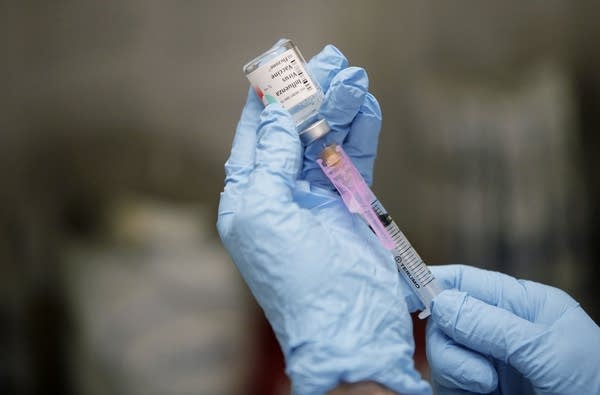Thousands of health care workers skip flu shots
Go Deeper.
Create an account or log in to save stories.
Like this?
Thanks for liking this story! We have added it to a list of your favorite stories.

Most U.S. health care workers don't get immunized against seasonal flu. And health care employers worry that trend will continue with the H1N1 vaccine.
In Minnesota, seasonal flu vaccination rates appear to be higher. But public health officials say there are still thousands of health care workers in the state who don't get a flu shot. That could put patients at risk for not only seasonal flu, but also the H1N1 virus.
Only 44 percent of U.S. health care workers got immunized against seasonal flu during the 2006-2007 flu season, according to the most recent data available from the National Health Interview Survey conducted by the federal government.
The rate in Minnesota appears to be much higher, but the numbers might be overly rosy. One state survey shows that 70 percent of hospital and nursing home workers get the seasonal flu vaccine.
Turn Up Your Support
MPR News helps you turn down the noise and build shared understanding. Turn up your support for this public resource and keep trusted journalism accessible to all.
But the Health Department says the self-reported figures have not been independently verified, and more than one-third of the providers who received the survey didn't even respond.
That means there are thousands of Minnesota health care workers who are not getting the seasonal flu shot. Lynne Riley is one of them.
"I'm comfortable having declined last year, and declining this year for the seasonal flu vaccine," said Riley, a nurse who works at the University of Minnesota Medical Center in Minneapolis.
The pressure to get the vaccine is subtle. Some hospitals are asking health care workers to sign a form if they refuse to get the flu vaccine.
Riley said she doesn't like the idea of getting a vaccine for a virus that she thinks her body could fight off on its own. She also wonders if it's harmful to get a flu vaccine year after year for decades.
But this year, Riley will probably make an exception for the H1N1 vaccine.
"I have children of the age that seem to be more vulnerable, as well as grandchildren, younger grandchildren," she said. "I am concerned about the fact that the people who have seemed to have gotten most sick are children and adolescents and young adults."
The H1N1 vaccine is made the same way as the seasonal flu vaccine, so the risks of taking it are thought to be about the same as the seasonal vaccine. Most people who get a seasonal flu immunization do not experience any significant side effects.
But the vaccine concerns are hard to dispell. At Hennepin County Medical Center in Minneapolis, Mary Ellen Bennett has spent a lot of time reassuring some health care workers about the safety of both vaccines. In particular, she says there's misinformation about the nasal spray doses, which contain a live, weakened flu virus.
"They felt that they could get influenza from the vaccine and we said, 'No, you're taking the vaccine to prevent you from getting influenza.'"
Bennett, who is director of Infection Prevention at HCMC, also reminds employees that if they don't get a flu shot they could be putting their patients at risk.
In one study, a hospital that increased its worker vaccination rate from 4 percent to 67 percent over 12 years appeared to eliminate the spread of flu to patients. The data showed that the number of patients who acquired a flu infection while in the hospital dropped from 32 percent to zero.
These findings have spurred professional organizations like the Minnesota Medical Association and the Minnesota Nurses Association to encourage their members to get a seasonal flu vaccination, as well as an H1N1 vaccination.
But the nurses group says if some people are not convinced they should get a flu shot, they shouldn't be forced. Barb Martin is part of a nurse bargaining unit at the University of Minnesota Medical Center.
"Would I like every nurse to get vaccinated? Yes I would. Do I think that will protect our patients, protect their families? Yes. Do I think all nurses should be forced to get it? Absolutely not," said Martin.
There is no law forcing Minnesota health care providers to get the flu vaccine. The state of New York is the only state with that mandate. It applies to both seasonal and H1N1 vaccinations. The mandate is being challenged, though. Recently a state Supreme Court judge temporarily halted its enforcement.
In Minnesota, the pressure to get vaccinated is more subtle. Some hospitals are asking health care workers to sign a declination form if they refuse to get the flu vaccine.
"We're not saying that anybody is taken off their job, or restricted from the work they do," said Dr. Bob Moraveck, medical director of St. Joseph's Hospital in St. Paul.
Moraveck says so far he's not aware of any repercussions for employees who refuse to get vaccinated. But there has been some talk about requiring unvaccinated workers to wear masks. He says that's not a popular suggestion, because masks can be uncomfortable.
"To tell somebody that when they feel healthy and so on, that for the entire flu season you're going to have to wear a mask every time to come to work -- that's going to be a tough call," Moraveck said.
There are also logistical challenges with pushing the new H1N1 vaccine. With so much flu already in the community, some employers have said the worst of the outbreak could be over by the time enough vaccine is available to vaccinate all of the state's estimated 200,000 health care workers.



